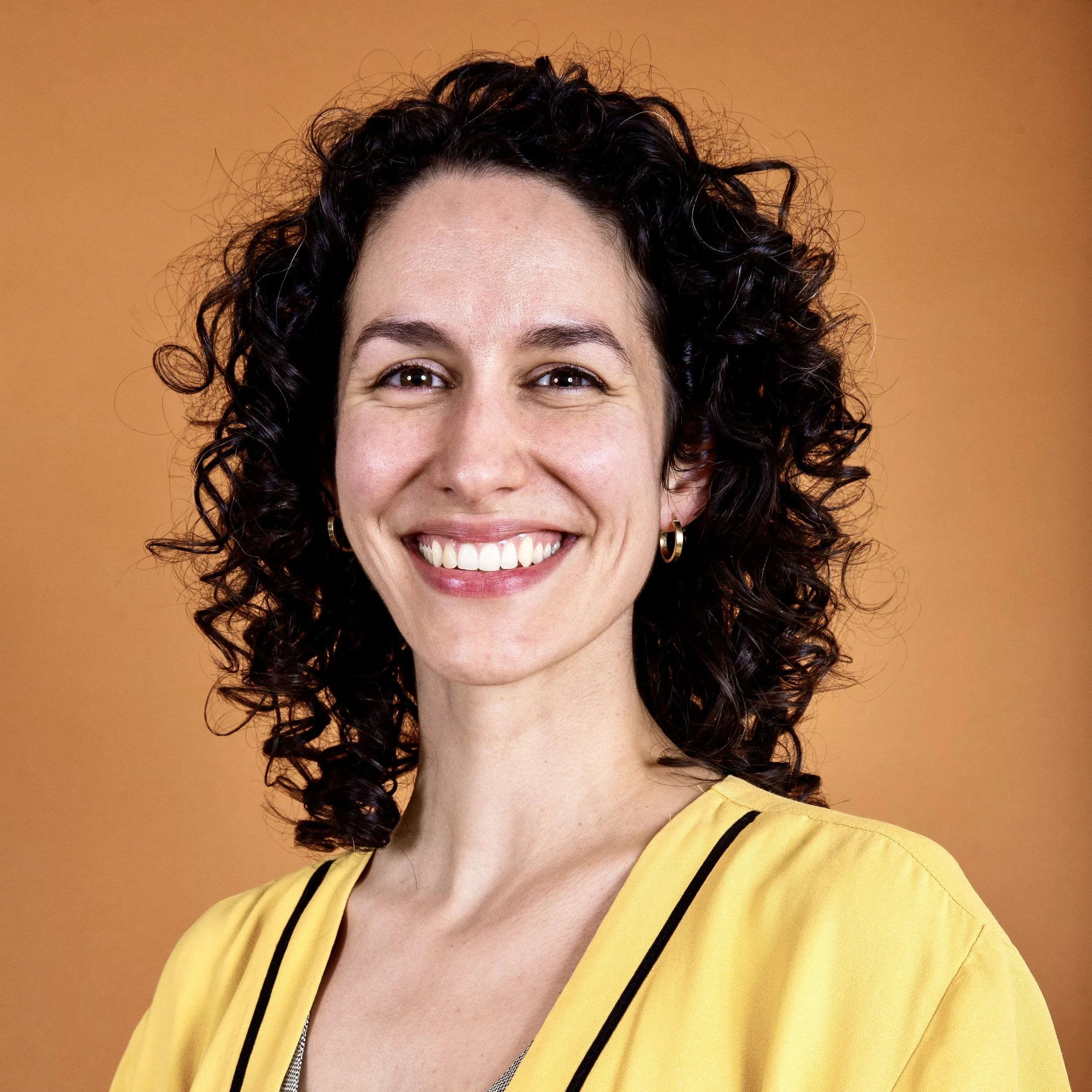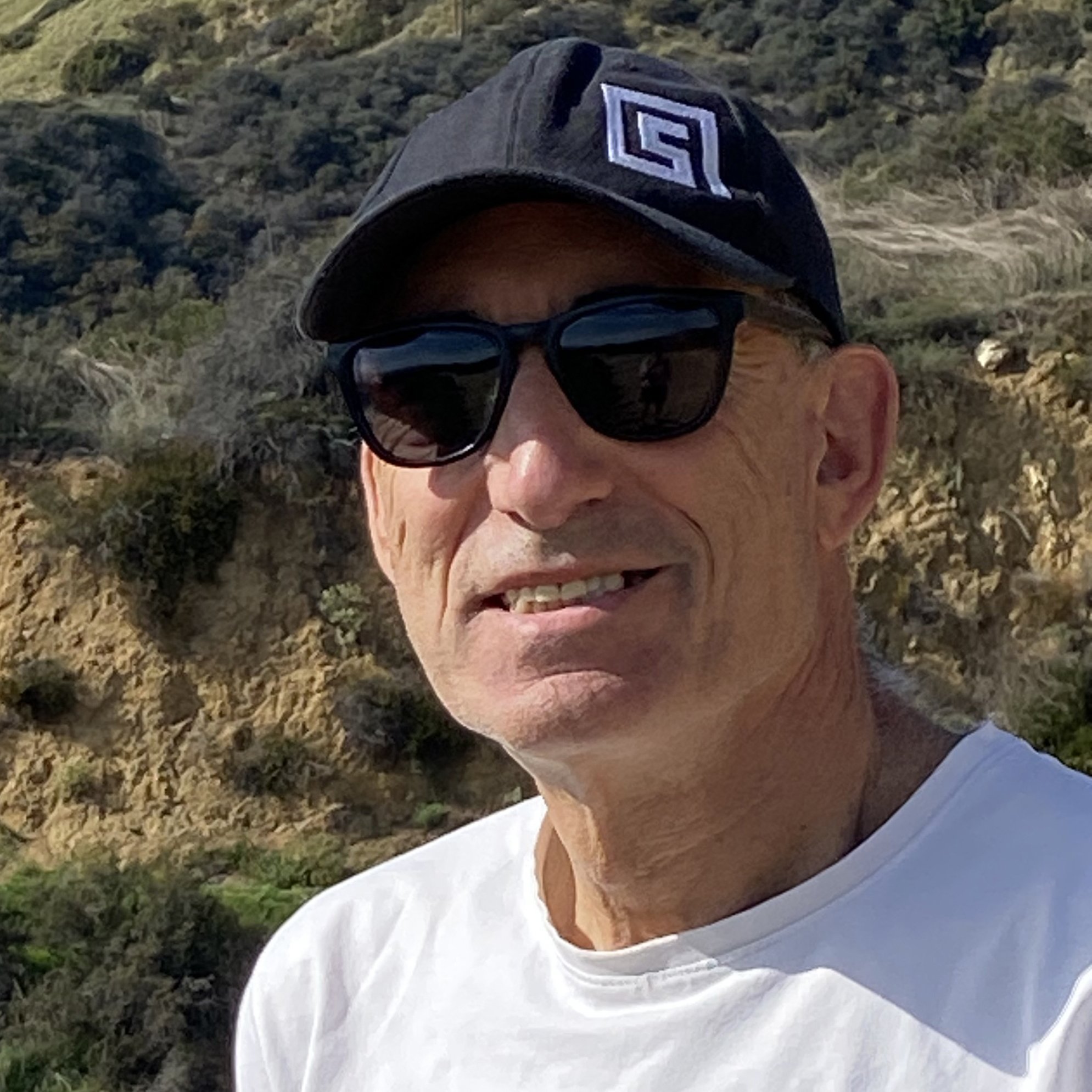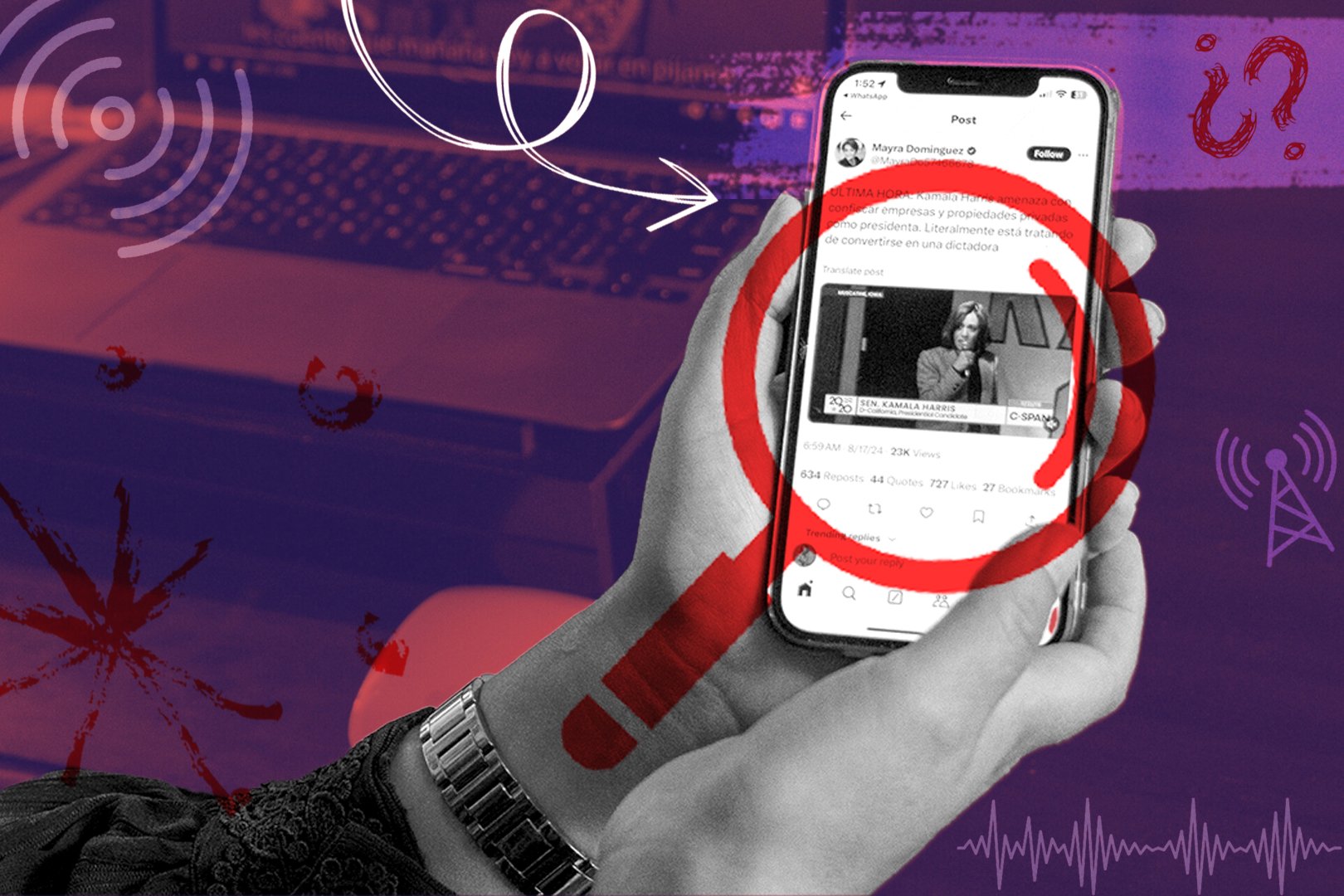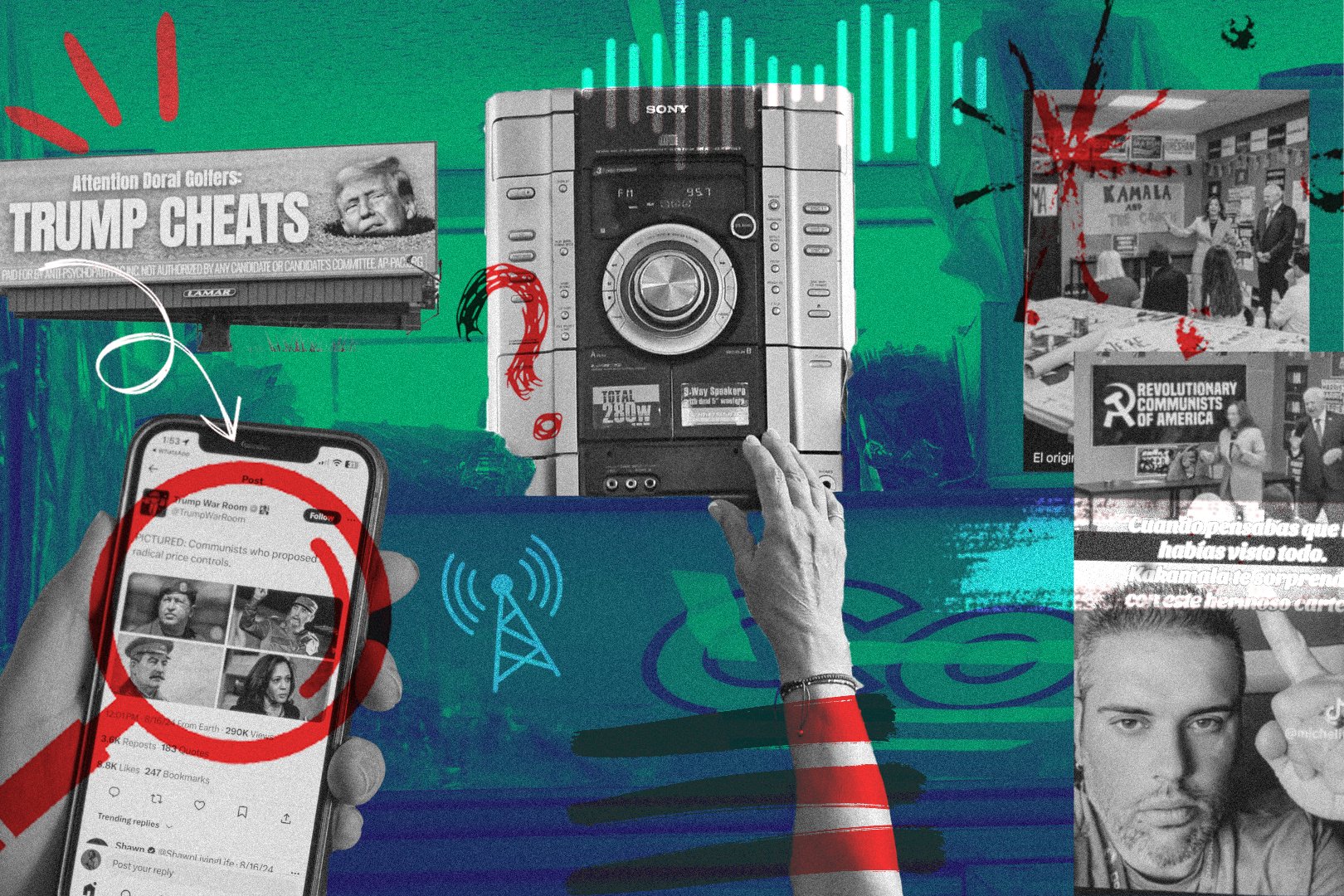How Culturally Specific Information — and Misinformation — Targets Latinos
Photo courtesy of Somos Votantes. Photo by Jennifer A. Ortiz for Feet in 2 Worlds. Photo collage by Yunuen Bonaparte/palabra
Latinos in the U.S. are not a monolith. Speaking to them with cultural competence could be a deciding factor in the coming election.
Editor’s note: This story is part of Frequency of Deception / Radiofrecuencia de engaños, a six-part series by Feet in 2 Worlds in partnership with WNYC’s Notes from America, palabra, and Puente News Collaborative on the spread of dis- and misinformation on Spanish radio in the U.S.
This radio piece was produced by Feet in 2 Worlds in collaboration with WNYC’s Notes from America.
Haz clic aquí para leer este reportaje en español.
At a busy café in the Arts District of Las Vegas, two organizers from Somos Votantes, a Latino-led and Latino-focused civic engagement organization, find respite from the above-average June heat. Angel Lazcano, the organization’s Nevada program director, speaks about being born and raised in a family of workers who belong to the culinary union, a political powerhouse in Las Vegas. He credits his dad with getting him involved in community organizing. His colleague Emmanuelle Leal-Santillan, the national communications and media director for Somos Votantes and Somos PAC, is wearing a navy blue shirt with the organization’s logo. He recently became a U.S. citizen. “My friends think that I'm crazy because I'm like, ‘Y'all, I got my first political mail in my mailbox. I am so excited!’” he said, laughing. “And I know it’s not just me,” he added, referencing the almost 4 million Latinos who have become eligible to vote since 2020.
Candidates and campaigns are taking note of the size and political power of the Latino voting bloc. Organizers like Lazcano and Leal-Santillan are working around the clock to connect Latino voters to the information they need to make their decisions at the ballot box. Like many, they are concerned about the proliferation of misinformation in Spanish on social media, on the radio, and within Latino communities around the country.
The recent decision by the Biden administration to seize Kremlin-run websites and bring criminal charges against two employees of Russian state media for attempting to interfere in the U.S. election are reminders that there are many forces pushing disinformation and misinformation ahead of this year’s election. For Latinos, the problem is compounded by a lack of culturally specific and accessible, accurate information.
Angel Lazcano (left), program director of Somos Votantes, and Emmanuelle Leal-Santillan (right), national communications and media director for Somos Votantes and Somos PAC. Photo by Paulina Velasco/Feet in 2 Worlds
Across the U.S., many Latinos live in news and information deserts — places that are underserved by local Hispanic media — making this population vulnerable to misinformation, which often spreads in the absence of trusted and reliable news outlets. Immigrant Latinos also come from cultures of listening to radio and sharing news and opinions with their community, all of which is facilitated today by a heavy reliance on social media. Misinformation often reaches Latinos by word of mouth or in family group chats on WhatsApp and other digital messaging sites. Latinos also consume a lot of YouTube content, being 27% more likely than non-Latinos to use the platform on a daily basis.
In Nevada, Latinos account for nearly 1 in 5 registered voters, and Nevada’s Latino voters are young; 40% are under 34 years old. According to TelevisaUnivision research from July 2024, just four months before the election, more than half (56%) of Latinos in the state said they needed more information about candidates in order to make their decisions.
Lazcano thinks language is a significant barrier to engaging many Latinos in the democratic process. “One thing that I hear from conversations with family and volunteers alike, ‘Si no me dijeras esto, nunca lo iba a saber,’” he said. “If you didn’t tell me, I wouldn’t know.”
Even so, the Somos Votantes organizers bristle at any suggestion that Latinos aren’t ready to go to the ballot box. But they do recognize the importance of providing Latinos with more information — one reason they prioritize the need to reach Latinos where they are. Somos Votantes runs the largest independent Latino civic and voter engagement programs in the country. In its 5-year history, the group has knocked on doors and invested in TV, digital, and radio ads, including on Spanish-language radio.
In early June, at a local Mexican restaurant in Las Vegas, Somos Votantes held a celebration of Latina moms that was also a voter engagement event. The organizers called it a success, with over 60 women signing up to receive postcards before the election to remind them to vote — and to remind others in their families to go to the polls. “Moms have this influence in our households,” Lazcano explained.
A Somos Votantes celebration of Latina moms and voter engagement at a Mexican restaurant in Las Vegas. Photo courtesy of Somos Votantes
In another part of Las Vegas, Eddie Diaz hosts “La Agenda Hispana,” a Spanish-language talk show, every Tuesday morning. He is the strategic director in Nevada of the Libre Initiative, a Latino-focused organization backed by the Koch political network that advocates for conservative, free market principles. The show’s theme uses the organization’s tagline, “Limited Government, Unlimited Opportunities,” but in Spanish: “Gobierno limitado, oportunidades ilimitadas.”
The station where Diaz broadcasts sells airtime to Latino broadcasters who represent perspectives across the political spectrum. Diaz said Libre welcomes the diversity of opinion among Latinos. “I think we're blessed right now in the country that we have, that we can raise our concerns and bring up our ideas,” said Diaz. “Because back in Latin America — you know, Mexico — sometimes those can cost you your life.”
In his show, Diaz says he counters misinformation by providing statistics and context that he receives from Libre headquarters. “When I'm talking about a certain issue … I could pull them up and, you know, share some stats with folks,“ he said. “I want more Latinos to be able to get engaged in civics... and not just be kind of like, thrown off by what they hear from the comadre,” said Diaz, referring to information spread between friends and relatives. He also plays this role in his personal life. “I've had some people just call me like, ‘Oh, I saw this in Facebook. Like, can you tell me what is this?’ And I'm like, ‘Well, let me figure it out and I'll get back to you.’”
Evelyn Pérez-Verdía, founder of We Are Más, shares an example of false information in Spanish accusing VP and presidential hopeful Kamala Harris of wanting to become a dictator. Photo by Jennifer A. Ortiz for Feet in 2 Worlds
Lazcano of Somos Votantes is his dad’s trusted messenger. His father, who’s in his early 50s, has worked as a waiter and busser at local casino restaurants. Lazcano, 24, helps his dad distinguish when an infographic is AI-generated, and makes a point to watch YouTube with him to verify the information he’s receiving.
The importance of this type of one-on-one communication in combating misinformation is backed up by recent research. In late 2023, the Information Futures Lab at Brown University piloted a program in an effort to better understand the information needs in South Florida. Twenty-five local participants were surveyed on a weekly basis about issues, questions, and rumors circulating in their communities. The program then equipped them with short, culturally relevant messages they could use to respond to those rumors.
“The 25 people that we had as information navigators have these WhatsApp channels with family members and friends,” explained Evelyn Pérez-Verdía, founder of We Are Más, the South Florida-based social impact organization that partnered with Brown. “But they also belong to AARP… soccer teams, soccer moms, gymnasts, Catholic school, Catholic church… you know, jujitsu!”
Belonging to multiple communities makes them effective communicators, said Pérez-Verdía. “All of us are in a way social media influencers because we all have our families, our circles of trust… we have people there that believe in us.” When the program shared accurate, accessible, and culturally competent information with these trusted messengers, it led to successful interventions in situations where Latinos often become misinformed.
Evelyn Pérez-Verdía, founder of We Are Más, at her office in Miami. Photo by Jennifer A. Ortiz for Feet in 2 Worlds
The Brown University researchers also found that in “the absence of culturally relevant, location-specific, multilingual answers,” Latinos became “more susceptible to the ‘answers’ being offered by disinformation actors or conspiracy theorists.” Those bad actors, the study argued, have a sophisticated understanding of how to target their messaging to specific groups.
Listeners who tune in to Spanish-language radio often hear conservative hosts and callers referring to Democrats as “socialists” and “the left.” This taps into the fear of Cuban and Venezuelan listeners, among others, who have survived leftist authoritarian regimes in their home countries.
On the other hand, Pérez-Verdía described how many liberal organizations don’t always seem to understand the power of certain terms and imagery to trigger negative associations among those same Latinos. For example, they use the word “progresista” to describe a candidate’s progressive politics, even though that term is often associated with socialist dictatorships in Latin America. Pérez-Verdía says it’s important to understand people’s diverse lived experiences in order to communicate effectively. “You're going to lose our communities because you just want to give one message.”
Evelyn Pérez-Verdía shows a YouTube video shared via WhatsApp, falsely linking Vice President Harris to communism and China. Photo by Jennifer A. Ortiz for Feet in 2 Worlds
In South Florida, home to large Cuban, Venezuelan and Colombian populations, the battle to reach Latinos with trusted information is especially intense. Many of Miami’s Latino residents were born outside of the U.S. Foreign-born Latinos are twice as likely as those born in the U.S. to get their news from outlets that target Latinos. Immigrant Latinos are also more likely to get their news in Spanish, and older Latinos follow the news more closely than younger ones.
Members of this precise demographic — a group of Latino senior citizens in Doral, a city on the outskirts of Miami — were playing dominos and eating lunch at an adult day care center on a hot morning in May. They were scheduled to meet Democratic U.S. Senate candidate Debbie Mucarsel-Powell. She’s originally from Ecuador, a former U.S. representative, now running against Republican Rick Scott for his seat in the U.S. Senate.
Support the voices of independent journalists.Until Dec. 31, your donations will be matched dollar-for-dollar. 
|
Mucarsel-Powell walked around the room introducing herself and chatting in Spanish with the older Cuban men and women. “They're part of my community. They're part of my family. They're my friends. They're my neighbors,” said Mucarsel-Powell. “And so it comes naturally to me to be in front of our Latino community talking about issues that matter most.”
Mucarsel-Powell is one of many candidates having conversations with Latino voters about the issue of reproductive rights. Like 9 other states, including Nevada and Arizona, which also have significant numbers of Latino voters, Florida has an abortion-related amendment on the ballot in November. Florida’s Amendment 4, which recently gained national attention because of comments by Donald Trump, is a state constitutional amendment that would protect the right to an abortion before fetal viability — the point at which a fetus can survive outside the uterus. This is usually around 23 weeks, according to the American College of Obstetricians and Gynecologists, which also says the term “fetal viability” is often misconstrued by ideology. Abortion is currently more restricted in Florida — it’s illegal if a patient is past 6 weeks pregnant. Amendment 4 would restore abortion rights that existed in Florida before the U.S. Supreme Court struck down Roe v Wade in 2022.
‘La lucha sigue (the struggle continues) … to ensure that the new story being told about us is not the sleeping giant, but the voters that decide elections.’
Latinos’ views on abortion are complex. Nationally, 59% of Hispanic adults in the U.S. say abortion should be legal in all or most cases, according to the Pew Research Center. That’s just shy of the 60% of white non-Hispanic Americans who hold that same view. A total abortion ban is unpopular among Latinos, with 68% of Latinos either somewhat or strongly opposing such a measure in a spring poll conducted by Axios/Ipsos.
Mucarsel-Powell frames the issue of abortion in a way she hopes will resonate with Latino voters on both sides of the aisle. “I was raised Catholic. I went to an all-girls Catholic school. And it's such a private and intimate matter for a woman. And Latina women understand that this should be their own choice without government interference.” She said the government chipping away at this civil right opens the door to increased violence against women.“It's what we've experienced in Latin America. It's what we've seen politicians do.”
While Mucarsel-Powell walked around the center greeting the seniors, Miriam Almer, who goes by “Cuqui,” checked that everything was running smoothly. Almer is the founder of MV Almer Productions, a company that organizes events for candidates to meet hard-to-reach voters, like working parents and senior citizens. “We bring it to them because sometimes they don't know how to go about (finding information) in a computer, find out who is who, what are the platforms,” said Almer. Seniors, Almer pointed out, are important voters to reach. In the 2022 midterms, almost two-thirds of voters nationwide were 50 or older.
Miriam "Cuqui" Almer organizes events through her company, MV Almer Productions, helping candidates connect with hard-to-reach voters such as working parents and senior citizens. Photo by Jennifer A. Ortiz for Feet in 2 Worlds
When asked where the folks in the room get their news, Almer said TV and a lot of radio. “That's how they get their information, especially the seniors. There's certain programs on radio that they don't miss.”
Some of those programs air on La Poderosa, “the powerful one,” a conservative talk radio station that broadcasts in Spanish in South Florida. This station popped up frequently in our investigation’s scans of potential misinformation on Spanish-language radio. On an evening in May, a host and her guest, a doctor, argued against Amendment 4 on the air, claiming it would allow girls to undergo abortions without their parents’ knowledge. This is false. Amendment 4 explicitly says it would not change the clause in the Florida state constitution which requires that parents of a minor be notified before the termination of a minor’s pregnancy.
On another Spanish-language radio station, Oasis Radio Miami, the host of a show in late May — who is also a Hispanic outreach director for the far-right group Moms for Liberty — shared false information about Amendment 4 with her listeners. She claimed on the air, as well as on social media, that the amendment would allow abortions until the last month of pregnancy, that parents would not be notified of their child’s abortion until after it was performed, and that anyone that identified as a healthcare provider would be able to perform abortions, even tattoo artists. All of these statements are false.
According to an Ipsos poll in spring 2024, Hispanic voters were less likely to support Amendment 4 than white Floridians. In polling from September 54.6% of all registered voters in Florida support the measure. It needs 60% to pass. So Latino voters — who account for one in five eligible voters in Florida — could play an important role in the outcome of this measure in November. This makes it all the more urgent to address the quality and accessibility of the information Latinos receive, especially in Spanish.
Residents at Metro South Senior Living in South Miami attend one of Miriam "Cuqui" Almer’s events. Almer notes that seniors often rely on the radio as their primary news source. Photo by Jennifer A. Ortiz for Feet in 2 Worlds
Nevadans will also have a chance to vote on abortion rights in this election. In 1990, Nevada citizens voted to protect abortion rights through a referendum that legalized abortion within 24 weeks of pregnancy. But in Ballot Question 6, voters will have the opportunity to enshrine the right to an abortion until fetal viability in their state constitution, making it harder to take that right away.

This article is part of U.S. Democracy Day, a nationwide collaborative on Sept. 15, the International Day of Democracy, in which news organizations cover how democracy works and the threats it faces. To learn more, visit usdemocracyday.org.
|
As in Florida, candidates up and down the ballot are weighing in as November 5 approaches, and in some instances, they are spreading misleading information. In audio obtained by The Nevada Independent, the Republican U.S. Senate candidate in Nevada, Sam Brown, said he did not support changing the existing law. The ballot measure would, in fact, establish the current law as a state constitutional right, not change it. He also said the measure would allow abortion until 40 weeks of pregnancy, which is misleading.
The proliferation of misleading and inaccurate information affects the ability of voters to make informed decisions at the ballot box. “La lucha sigue (the struggle continues),” said Leal-Santillan of Somos Votantes, “...to ensure that the new story being told about us is not the sleeping giant, but the voters that decide elections.” To combat misinformation specifically aimed at Latinos, organizations like We Are Más, the Venezuelan-American Caucus, and Factchequeado keep track of the ever-evolving landscape of misinformation and disinformation in Spanish. They provide resources and strategies to educate Latinos on what they read and hear about the candidates and the issues so they can go to the polls with accurate information. But when a falsehood has been stated on the radio or shared on social media, like a wildfire, once started, it becomes difficult to extinguish.
Angel Lazcano speaks to attendees at Nevada Votería Night, an event hosted by Somos Votantes to watch the presidential debate on Sept. 10. Photo courtesy of Somos Votantes
—
This series is based on original reporting by investigative reporter Martina Guzmán. Logo design by Daniel Robles.
Stanford University journalism students Jordan Rynning, Janelle Olisea, Eve Lu, and Xavier Martinez contributed to this report, as well as Irene Casado Sanchez, Big Local News data journalist.
Feet in 2 Worlds is supported by the John D. and Catherine T. MacArthur Foundation, The Ford Foundation, the Fernandez Pave the Way Foundation, an anonymous donor, and contributors to our annual NewsMatch campaign. The Fund for Investigative Journalism provided funding for this project.
Paulina Velasco is a multilingual journalist based in California. She has made narrative documentaries and interview shows for 10 years for a variety of outlets, including Marketplace, LWC Studios, Slate, Pacifica Radio and NPR member stations. She writes for The Guardian about immigrants’ experiences in Southern California and particularly at the San Diego-Tijuana border–just 10 miles from where she grew up. Paulina was also the editor of the inaugural season of 100 Latina Birthdays, an audio documentary series about Latina health in the U.S. Her political science education helps her interrogate structures and policies, and her curiosity and empathy empowers her to accurately portray the lives of people who are often misrepresented in the media. She has lived in Mexico, France and New Zealand, and loves reading books by Latina authors — a group she one day aspires to join. Portrait by Las Fotos Project. @_pinavelasco
Jennifer A. Ortiz is a Cuban-American photographer and graphic artist born and raised in South Florida. Her work explores environments, trauma, healing, identity, histories and memory.
John Rudolph is the founder of Feet in 2 Worlds, a leader in centering immigrant voices in journalism. Created in 2004, Feet in 2 Worlds (Fi2W) is an independent media outlet, journalism training program and launchpad for emerging immigrant journalists and media makers of color. Fi2W brings positive and meaningful change to America’s newsrooms and has a broader impact on how immigration is reported and the ethnic and racial composition of news organizations. Over nearly five decades in journalism John has covered events in the U.S. and around the globe with a special focus on immigrants and immigration, U.S. politics, and environmental issues including climate change, population growth, and industrial pollution. His work has been honored by numerous journalism awards.
Martina Guzmán is the director of the Race & Justice Reporting Initiative at the Damon J. Keith Center for Civil Rights at Wayne State University Law School in Detroit, Michigan. Her reporting covers immigrant communities and systemic inequality. She was named Best Statewide Individual Reporter by the Associated Press for her work at WDET, Detroit’s NPR affiliate. Her exploration into the rise and fall of global, post-industrial cities earned her Best Investigative Series from the Michigan Broadcasters Association and the Associated Press of Michigan. Martina was the Detroit correspondent for The Takeaway, a radio news program by Public Radio International and WNYC. She has received numerous grants and fellowships, including the MacArthur Foundation, the German Marshall Fund and a Ford Foundation, to investigate the impacts of water shut-offs on women of color in South Africa and Detroit. She is a graduate of the Journalism School at Columbia University in New York City and a 2023 John S. Knight Journalism Fellow at Stanford University.




















